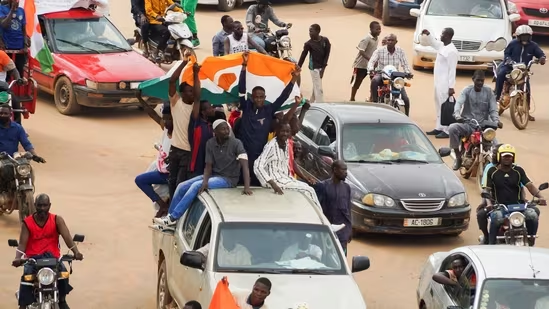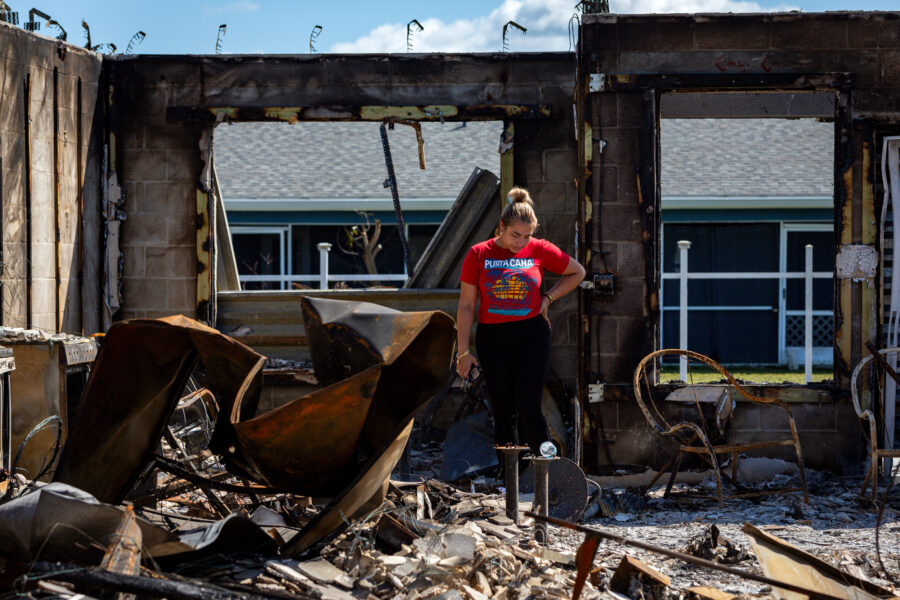Fanatics and putschists are creating failed states in west Africa
Mohamed Bazoum, Niger’s president, was under no illusions. He understood how coups in two of his neighbouring countries, Burkina Faso and Mali, had undermined their fight against the jihadists running rampant across much of the Sahel. Military rule weakens the army, deprives it of international military assistance and saps the state’s ability to deal with jihadist violence, he told The Economist in May. “The whole bet for us is...to promote [good] governance that has the effect of protecting us against a coup,” he said. On July 26th, he was ousted by the head of his presidential guard, General Abdourahamane Tchiani.  PREMIUM
PREMIUM
The toppling of Mr Bazoum, who assumed office in 2021 in Niger’s first ever democratic transfer of power, has triggered an unprecedented crisis. The immediate worry is that it may ignite a regional war. Even if that danger is averted in the next few days, the putsch will almost certainly deal a crushing blow to efforts to fight the world’s most dangerous jihadist insurgency, which has claimed tens of thousands of lives in the three core countries in the Sahel: Burkina Faso, Mali and Niger.
The most pressing risk is that Niger’s neighbours are drawn into the conflict as they square off behind either the junta or Mr Bazoum. Bola Tinubu, Nigeria’s president who was briefly jailed in 1994 by a military dictator, has made opposition to coups a cornerstone of his foreign policy. “We will not allow coup after coup,” he said in July when he was elected chairman of the Economic Community of West African States (ECOWAS), the regional bloc, referring to the five coups that had taken place in three of the bloc’s members since 2020.
Niger is the first test of Mr Tinubu’s policy and ECOWAS has said that it will take military action if Mr Bazoum is not reinstated by August 6th. Many in the region see this as a bluff, but Alex Vines, the head of the Africa programme at Chatham House, a think-tank in London, believes that the threat of force is credible. “Mr Tinubu is allergic to putschists,” he says. “He was personally incarcerated by them and has no love for them.” Niger has said it will defend itself against any intervention and Burkina Faso and Mali, both under military rule, said they would treat the deployment of an ECOWAS force in Niger as a declaration of war. Perhaps anticipating trouble, at least four European countries, including France, have begun preparations to evacuate their citizens.
There is still a chance that the immediate crisis will be averted through talks. But anything short of the full restoration of democratic rule in Niger will dash the region’s best hope of holding back the thousands of extremists affiliated with al-Qaeda and Islamic State (IS) who have cut a bloody swathe across the Sahel. The region, an arid poor strip south of the Sahara, has supplanted the Middle East as the centre of global jihadist terror. Over the past decade, at least 42,000 people in the three countries at the core of the Sahel have been killed in jihadist-related conflict, according to the Armed Conflict Location & Event Data Project (ACLED). About 3.3mn people have fled their homes. The insurgency in the region is part of a wider spread of jihadism in Somalia and around Lake Chad that has claimed more than 100,000 lives since 2014.

Worryingly, jihadists seem to be winning the war in the Sahel almost everywhere but in Niger. Last year the death toll in the region increased by 75%, to more than 10,000. This year looks as if it will be bloodier still (see chart 1). The militants are also spilling over borders and threatening west Africa’s wealthier and more densely populated coastal states, such as Benin, Ghana, Ivory Coast and Togo.
The jihadists’ bloody toll goes a long way to explaining why coups have become so common in the Sahel. Civilian governments that were unable to restore order have been overthrown in Mali (in 2020) and Burkina Faso (in 2022). And because coups beget coups, there have been further putsches in each country. In every case, the gun-toting men claimed to be saving their countries from jihadists. Yet they have proved to be far less competent than the elected governments they have overthrown.
Start with Mali, which in 2012 was battling not just jihadists but also separatists from the Tuareg ethnic group. Only the rapid intervention of a French force stopped the two groups from marching on the capital, Bamako. A fragile UN-supported peace deal was reached with the separatists, though disarmament stalled. Meanwhile, the jihadists have kept on killing. For much of the time since, a combination of local forces, French commandos and around 13,000 UN peacekeepers have helped secure the capital and large towns in the north such as Gao and Timbuktu. Even so, the jihadists continued to extend their control over much of the countryside. As deaths kept rising, mounting frustration with the government sparked a coup in 2020.
The junta, unable to stem a continued rise in violence, has since pushed out French forces and turned to Wagner, a Russian mercenary group, prompting Mali’s other Western backers including Germany to withdraw their own troops. Wagner has killed wantonly, yet it has been unable to restore security. In May a UN report found that more than 500 people were killed by the army and “armed white men”, almost certainly Wagner mercenaries, over the course of four days in a village called Moura. Most of the victims were murdered in cold blood. Soldiers stole bedding, placed it under trees and took turns raping local women. Both jihadist violence and abuses by the security forces and Wagner are likely to increase next year after the UN’s 13,000 peacekeepers are withdrawn, having been told to leave by the junta. With them gone, some fear open warfare with the separatists may return.

The situation is also grim in Burkina Faso. After two coups last year, its new military ruler, Captain Ibrahim Traoré, declared “total war” on jihadists, but to no avail. Burkina Faso accounts for more than two-thirds of jihadist-related deaths in the central Sahel this year. Around 2m people have fled their homes and 26 towns are blockaded by jihadists. The government controls as little as 40% of the country. “We can perhaps speak now about a failed state,” says a French military official.
Having consolidated their bases in Mali and Burkina Faso, the jihadists have also begun expanding into the coastal states. Fatalities, though a small fraction of those in the Sahel, have been rising sharply. Togo has tried to repress reporting of attacks, but in April President Faure Gnassingbé admitted that about 40 soldiers and 100 civilians have been killed so far. He warned Togolese to “expect a long fight with dramatic moments”. In Benin last year 83 people died in jihadist attacks, according to ACLED. There, too, violence is escalating, with 71 more deaths recorded by mid-July.
Some countries along the coast are doing a better job of fortifying themselves against the onslaught. In Ivory Coast, for example, the government has poured money into infrastructure and basic services in border communities to try to dim the appeal of jihadism. Attacks have since slowed.
Although Ghana has not yet suffered any jihadist attacks, hundreds of young Ghanaian men have been recruited and taken to training camps in the Sahel by jihadists before returning to their villages. “The threat of terrorism...is real,” Ghana’s defence minister told its parliament earlier this year.
You might have expected Niger to be in the worst trouble of all. It suffers three big sources of instability: the same jihadist groups that are ravaging Mali and Burkina Faso; a plague of cross-border bandits from Nigeria; and a separate conflict around Lake Chad with Boko Haram, another jihadist group. Yet it is curbing the carnage. Fewer people were killed in Niger in the first six months of this year than in the first half of any year since 2018.
The reason Niger is exceptional is largely because Mr Bazoum had taken a radically different approach to fighting the jihadists. His strategy involved improving government services, talking with the terrorists and making extensive use of Western military help. To understand why this strategy appears to have worked, listen to jihadists themselves. Asked why he joined a radical group, Boubacar Moussa does not mention religion. Instead, he stresses more Earthly motives. In his village he had nothing. With the jihadists: “Everything you want, the bosses will give you…money, women, meat and a motorbike.” Never mind the holy struggle to build a caliphate; in a poor region like the Sahel, looting can be more lucrative than honest work.
But there is more to it than this. Before he joined Nusrat al-Islam, an al-Qaeda-linked group that operates in Mali, Burkina Faso and Niger, he was scared and resentful. Other young men he knew had been killed by soldiers, who sometimes suspected more or less any young man from the wrong tribe of being a jihadist. And the jihadists themselves used fear to recruit, as Mr Moussa well knows. His job, he says, was to cut off the heads of men who refused to join. He jabs his hand at his throat to emphasise this gruesome confession. He does not recall exactly how many men he murdered. Perhaps ten, he ventures.
Yet Mr Moussa recently abandoned jihadism, taking up a demobilisation plan backed by Mr Bazoum, who promised that if jihadists renounce violence they could “be reintegrated into society, and economically”. Relatives and other trusted intermediaries were enlisted by the government to persuade jihadists to lay down their arms, explains Hama Adamou, another ex-jihadist commander now in a safe house in Niamey.
Mr Bazoum’s strategy relied on other kinds of dialogue, too. Some talks aimed to reduce ethnic clashes between farmers and semi-nomadic herders, who are often of the Fulani ethnic group. Jihadists exploit such clashes to recruit new fighters, often posing as protectors of herders. “We are promoting reconciliation,” Mr Bazoum said in May, noting a local peace pact that was signed earlier in January between community and religious leaders and self-defence groups. Violence in the area, once widespread, has ebbed.
The deal was tacitly approved by Islamic State Sahel (IS Sahel), one of the two biggest jihadist groups in the region, which sent emissaries to the pact’s signing and met the minister of interior, says a mediator.
Bolder still were Mr Bazoum’s unwritten ceasefires with jihadists, of which there were many, says General Mahamadou Abou Tarka, who before the coup was the head of a body charged with managing talks with armed groups. One such agreement was a pledge not to stage attacks in a particular commune for six months if the government in return sent food to help its local population.
The government has also been in contact with Jama’at Nasr al-Islam wal Muslimin (JNIM) an al-Qaeda-affiliated coalition, says Ibrahim Yahaya Ibrahim of Crisis Group, a think-tank. JNIM commanders “send messages saying…we will not attack you if you do not attack us,” he says. The group also asked the government to free some prisoners, which it did, he says.
All this could now unravel. General Tchiani, in his first speech since the coup, criticised Mr Bazoum’s security policies, particularly that of releasing jihadists. His regime has also arrested Mr Bazoum’s interior minister, who was a crucial backer of the local peace deals. Niger has been reducing the army atrocities that push young men like Mr Moussa towards jihadism (see chart 2). By contrast in Mali and Burkina Faso, they have increased sharply under military rule (see chart 3).


The putsch also puts in doubt the second big element of Mr Bazoum’s successful approach: close military co-operation with the West. France had some 1,500 forces operating alongside the Nigerien army and America has over 1,000 military personnel in the country, most of them deployed on several drone bases. The results were visible on the front line. Niger’s forces are “better than before, with better equipment and better intelligence”, says a Nigerien gendarme who patrols the border and has trained with Western forces.
Yet now the junta appears to be swiftly turning against Niger’s Western backers, who have uniformly denounced the coup. On July 30th crowds egged on by the putschists attacked the French embassy and tried to set it on fire. Even without such provocations, it seems unlikely that France, America and their European allies will continue to work with and train Niger’s army while the country is under military rule. One consequence, says a Western military official bluntly, will be “more terrorist attacks”.
Before its coup, Niger offered the only glimmer of hope that the jihadists in the Sahel could be defeated—not through force of arms alone but by a government that was willing to talk and genuinely trying to respond to the needs of its people. If the coup is allowed to stand, that light will be snuffed out, casting the central Sahel and its more than 70m people into darkness.
© 2023, The Economist Newspaper Limited. All rights reserved. From The Economist, published under licence. The original content can be found on www.economist.com
Experience unrestricted digital access with HT Premium
Explore amazing offers on HT + Economist Start 14 Days Free Trial Already Subscribed? Sign In
Disclaimer: The copyright of this article belongs to the original author. Reposting this article is solely for the purpose of information dissemination and does not constitute any investment advice. If there is any infringement, please contact us immediately. We will make corrections or deletions as necessary. Thank you.
Title:Fanatics and putschists are creating failed states in west Africa
Url:https://www.investsfocus.com









